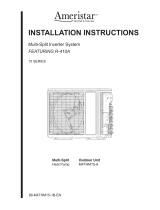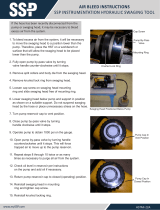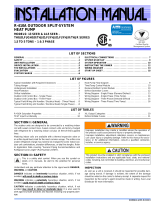
Preface
© 2009 Trane All rights reserved MS-SVN15B-EN
General Information
This Installation Manual is given as a guide to good practice in the installation by the installer of
MCX mini-split system. Installation procedures should be performed in the sequence that they
appear in this manual.
For installing the unit to operate properly and reliably, it must be installed in accordance with
these instructions. Also, the services of a qualified service technician should be employed,
through the maintenance contract with a reputable service company.
Read these Installation Instructions completely before installing the air conditioning system.
About this Manual
Warnings and Cautions appear at appropriate places in this Instruction Manual. Your personal
safety and the proper operation of this machine depend upon the strict observance of these
precautions.
The Trane Company assumes no liability for installations or servicing performed by unqualified
personnel. All phases of the installation of this air conditioning system must conform to all
national, provincial, state and local codes.
WARNING
Grounding Required!
Follow proper local and state electrical code on requirements for grounding. Failure to
follow code could result in death or serious injury.
About the Unit
These MCX/MWX units are assembled, pressure tested, dehydrated, charged and run tested
before shipment. They are charged with nitrogen, and could be used in applications with R-22
and R-410A refrigerant. For further information on refrigerant and piping connections refer to the
outdoor unit manual or contact your Trane local office.
The information contained in this manual applies to MCX/MWX units are designed to operate in
cooling mode only (MCX) and in cooling or heating modes (MWX).
Trane MCX/MWX series of mini-split systems offer three styles of installation: floor, low wall and
under ceiling with both LCD wireless remote control or wired control. Trane MCX/MWX series
provide flexibility and savings.
Note: For model MCX/MWX 042, MCX/MWX 048 and MCX/MWX 060, there are only two styles
of installation: under ceiling and low wall.
NOTICE: Warnings and Cautions appear at appropriate sections throughout this
literature. Read these carefully.
WARNING: Indicates a potentially hazardous situation which, if not avoided, could
result in death or serious injury.
CAUTION: Indicates a potentially hazardous situation which, if not avoided, could
result in minor or moderate injury. It may also be used to alert against unsafe practices.
NOTICE: Indicates a situation that could result in equipment or property-damage only
accidents.






















